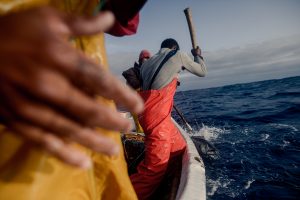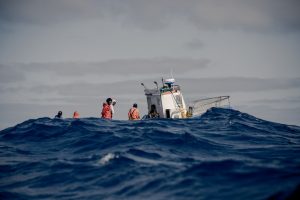Cape Verde (or Cabo Verde) is an island nation spanning an area of 4,033 km² in the Atlantic Ocean off the northwestern coast of Africa. The Archipelago is divided into two island groups, the Barlavento (windward) islands of Santo Antão, São Vicente, Santa Luzia, São Nicolau, Sal, and Boa Vista, and the Sotavento (leeward) islands of Maio, Santiago, Fogo, and Brava. Cape Verde is home to over 590,000 habitants and its islands are rich in terrestrial and maritime biodiversity. Fishing and tourism are the most important economic activities in the country, even though less than 1% of its coastline is effectively protected.

For the local communities in Cape Verde, the yellowfin tuna handline fishery provides an important source of employment and income, as well as protein, due to the islands’ remote location. Fishers catch fish one at a time using a single line with a hook attached, in a highly selective method that prevents the bycatch of dolphins, turtles, and sharks, as well as a negative impact on different marine habitats as fishing takes place at the surface of the ocean. Local canneries or factories receive the tuna, process it and supply it locally or export it around the world. Women make up a large portion of the factory teams and are responsible for selling the tuna on to the local markets. All waste products from the canneries is also processed into chicken feed which is sold to local famers.
 Cape Verde’s ongoing fisheries management plan (in which juvenile protection is a central point) is focused on resource sustainability, and is aligned with international standards from ICCAT (International Commission for the Convention of Atlantic Tunas) and the FAO.
Cape Verde’s ongoing fisheries management plan (in which juvenile protection is a central point) is focused on resource sustainability, and is aligned with international standards from ICCAT (International Commission for the Convention of Atlantic Tunas) and the FAO.
Cape Verde has a stable capacity of 20 to 30,000 tonnes of tuna, but at the moment only around 5,000 tonnes is being fished, with 8,000 tonnes assigned to the EU. In order to fish and produce at the maximum capacity, the local government is looking to upgrade the technical ability of the Cape Verde fishing fleet.
With further effort from Cape Verde to ensure stock viability and secure livelihoods for fishers, they can prove to be a beacon of hope for small-scale fisheries around the world. Demonstrating that one-by-one methods can help feed entire countries whilst contributing to economic growth.